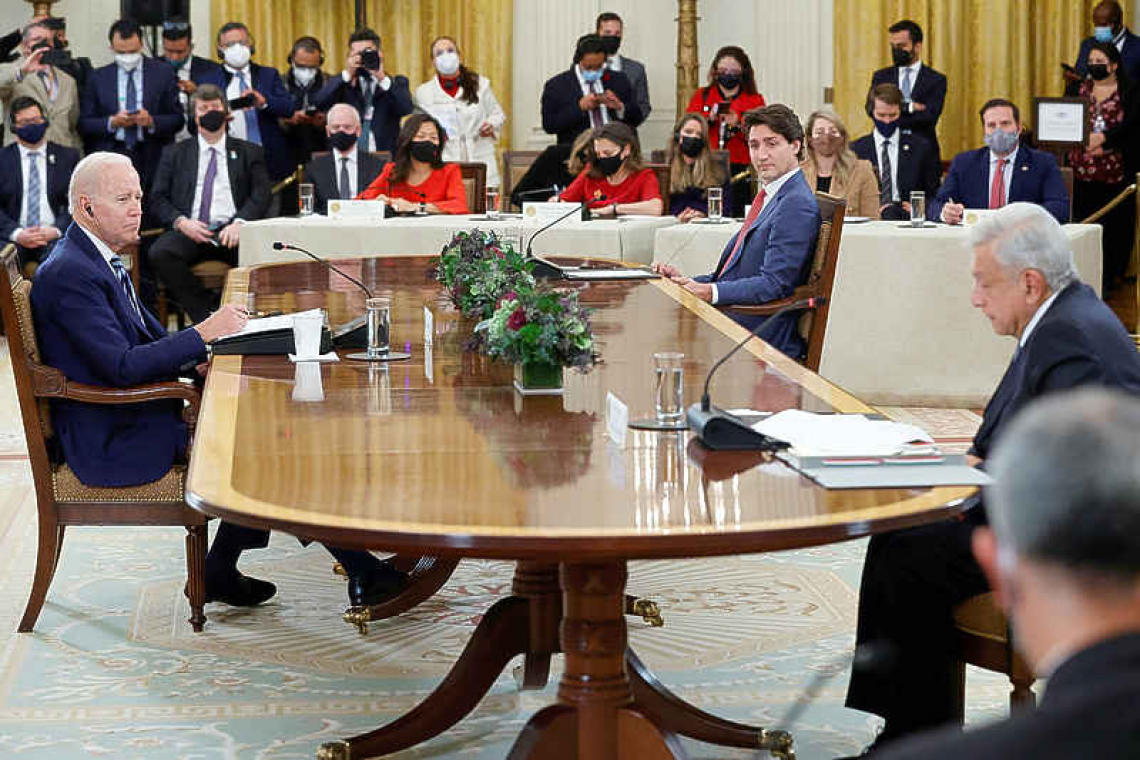WASHINGTON--U.S. President Joe Biden hosted Canadian and Mexican leaders on Thursday for their first North American summit in five years in a bid to revitalize regional cooperation that was shadowed by tensions over Biden's "Buy American" agenda and immigration.
Biden met separately at the White House with Canadian Prime Minister Justin Trudeau and Mexican President Andres Manuel Lopez Obrador, and then held a gathering with all three. The talks were aimed at finding common ground among the three neighbours bound together by the United States-Mexico-Canada (USMCA) free trade agreement, which governs some $1.5 trillion a year in North American trade.
But differences over the auto industry, Biden's "Buy American" policies and a Mexican energy bill weighed on the summit. The United States and Canada also appeared at an impasse over a Biden administration proposal for tax credits on U.S.-made electric vehicles, which Ottawa says violates trade agreements.
While there was no sign of major breakthroughs, Biden hoped to make headway on the thorniest challenges with America's two biggest neighbours, including easing immigration pressures, reducing trade friction, recovering from the global pandemic and competing better with an increasingly assertive China. "Our North American vision for the future draws on our shared strengths," Biden said, sitting at a long table that allowed the leaders to maintain distance in keeping with COVID-19 protocol.
"We have to end the pandemic and take decisive action to curb the climate crisis. We have to drive an inclusive economic recovery," Biden said. "We have to manage the challenge of unprecedented migration in our hemisphere."
Among the tangible gains expected from the summit were agreements on new methane curbs and COVID-19 vaccine donations, senior Biden administration officials said ahead of the talks.
The meetings are a result of a push by Biden to revive the so-called Three Amigos, a working group ditched by his predecessor Donald Trump. Resetting ties with Mexico and Canada is part of Biden's effort to turn the page on the Trump era, shifting away from his predecessor's strident go-it-alone approach to a more collaborative style.
Trump had especially fraught dealings with Trudeau, imposing tariffs on some Canadian goods and sometimes hurling public insults at the Canadian premier. Lopez Obrador, a left-wing populist, was able to forge an unlikely working relationship with Trump despite the Republican president's economic threats and insults against Mexicans over migration.
Nearly 10 months after taking office, Biden could use a diplomatic bright spot. He faces sagging approval ratings and is trying to tamp down inflation and supply chain issues while grappling with record numbers of migrants arriving at the U.S.-Mexico border.
Biden is under domestic pressure to curb the sharp increase in migrants' crossings, which Republican opponents have derided as an "open border" policy, and he needs Mexico's cooperation. In brief remarks to reporters during bilateral talks, Biden - holding his first in-person meeting with Lopez Obrador since taking office in January - said migration was among the main issues they were tackling, but did not elaborate.
Sitting alongside Biden, Lopez Obrador thanked the president for proposals that could improve the status of many long-time immigrants to the United States, and he urged U.S. lawmakers to back such a move. The fate of any Biden immigration initiative remained uncertain in the U.S. Congress.
In addition to agreements expected on cutting methane emissions and donating vaccine doses to other countries, the leaders were set to commit to prohibiting imports of goods made with forced labour, a policy Biden's administration has been aiming at China. Activists and Western politicians accuse China of using forced labour in its northwestern Xinjiang province, an allegation Beijing denies.
Sounding the alarm about Beijing, Lopez Obrador said during the three-way meeting that greater North American economic integration, including "stopping the rejection of migrants" needed for the U.S. and Canadian labour force, would be the best way to face "the productive and commercial expansion of China." Lopez Obrador's prescription appeared to echo Mexican Economy Minister Tatiana Clouthier's call for the United States to "buy North American" instead of adopting protectionist measures.
The Mexican president warned that North American countries could be headed for an "unacceptable imbalance" of economic power with China that "would keep alive the temptation of trying to resolve this disparity by use of force."







